Killer Coke Update | March 23, 2010
The Campaign to Stop Killer Coke Growing Worldwide
- WE NEED YOUR PROXIES for Coke's Annual Meeting on April 21st.
- The Coca-Cola Case Coming to More Theaters in Canada
- Lawsuit Hits Coke with New Charges of Murder, Rape, Torture in Guatemala
- Recent College Activities in Canada, Sweden & the U.S.
- Health Issues Coke Wants to Hide
- India's Kerala State Gov't Seeks $48 Million Fine from Coke, etc.
- StopKillerCoke in Mexico
- New Alternative to Coke in France
- An Olympian Chorus in Canada: [Coke is the] "Drink of the Death Squads"
1. WE NEED YOUR PROXIES for Coke's Annual Meeting on April 21st.
Mobilization for Coke's April 21st Shareholders' Meeting in Duluth, GA
We need help to mobilize a protest at Coca-Cola's annual shareholders' meeting, which will be held on Wednesday, April 21st, starting at 9:00 a.m. The meeting is being held at the Gwinnett Center, Grand Ballroom, 6400 Sugarloaf Parkway, Duluth, Georgia.
The annual meeting is the only place we can challenge Coke's chief policymakers — the top executives and members of the company's board of directors — face-to-face. By having a visible presence at the meeting, we can serve a warning to the stockholders, creditors and other potential investors that until the company cleans up its act, they will be held accountable.
The Campaign to Stop Killer Coke is working with individuals, other organizations and stockholders to hold Coke accountable around serious labor, human rights, health and environmental abuses. If you or your organization would like to participate in or help mobilize for activity inside or outside the annual meeting, contact us at (718) 852-2808 or e-mail us at info@killercoke.org.
Stockholders are now receiving their notice of the annual meeting and proxy card from The Coca-Cola Co. If you are not able to attend the annual meeting and would like to help the Campaign, we would like your proxy assigned to us so that others can attend. You can contact us at (718) 852-2808 or info@killercoke.org and we will explain how to transfer your proxy. If proxyholders plan to attend the shareholders' meeting and would like to join protest activities, please contact us.
2. The Coca-Cola Case Coming to More Theaters in Canada
The Coca-Cola Case follows labour rights lawyers Daniel Kovalik, Terry Collingworth and activist Ray Rogers of the Campaign to Stop Killer Coke as they attempt to hold the giant U.S. multinational beverage company accountable in a legal and human rights battle.
Feature documentary The Coca-Cola Case directed by German Gutierrez and Carmen Garcia will be screened at the Royal starting on March 26. The Coca-Cola Case was produced by Argus Films in co-production with the National Film Board of Canada.
German Gutierrez and Carmen Garcia will attend the screenings on March 26 and 27 for introductions and audience Q&As, and on March 28 for an introduction only.
Toronto theatrical release
March 26 to April 1 at the Royal
608 College St. West, Toronto
Friday, March 26 at 7 pm
Saturday, March 27 at 3:00 pm
Sunday, March 28 at 7 pm
Monday, March 29 at 7 pm
Tuesday, March 30 at 7 pm
Wednesday, March 31 at 7 pm
Thursday, April 1, at 7 pm
General Admission: $10
Students & Seniors: $8
Cape Breton Release
Monday March 22, 2010
Screening begins 19h00
Venue: Inverness Education Centre/Academy, Inverness
Film Kicks Off Human Rights Film Festival in Paris
An email from Solange, a campaign supporter, in France:
"The film [The Coca-Cola Case] yesterday was a success! There were many students and also very different people; the theater was not too large, about 350 seats. It was full and some people couldn't have a seat; they have to come back. The film will be shown again today at 6 pm, tomorrow — Thursday — and also Friday at 12 o'clock. I will see it again, Friday with some colleagues. At the end, people pointed out the problem of the social responsibility of international firms and environmental abuses...very interesting....Ray, Terry and Dan have been much acclaimed! One regret — newspapers don't speak enough about it; I hope that will change soon; we will work for this!"
Pittsburgh City Paper, "Silent Film," By Kate Giammarise, March 18, 2010
Read Article
"The question at the heart of the documentary is presented by Terry Collingsworth, the executive director of Washington, D.C.-based International Rights Advocates. 'How legally accountable is a major corporate brand like Coca-Cola for the activities in its far-flung plants in places like Colombia?' Collingsworth asks.
"The Colombian union Sinaltrainal decided to find out by filing a half-billion dollar lawsuit. The action was filed in 2001 in U.S. District Court for the Southern District of Florida, using the centuries-old Alien Tort Claims Act. That law allows foreigners to sue in American courts for violations of "the law of nations or a treaty of the United States."
Screened at the University of Pittsburgh. Prior to the screening, Campaign Director Ray Rogers addressed the large audience through a Skype hookup and answered questions afterwards. Students later remarked: "We're glad we're a Pepsi campus. We want nothing to do with Coke."
Bakchich Info, "Coca-Cola, du plomb dans le gaz en Colombiek," By Anthony Lesme, March 9, 2010
Read Article in French
Read Article in English (Google translation)
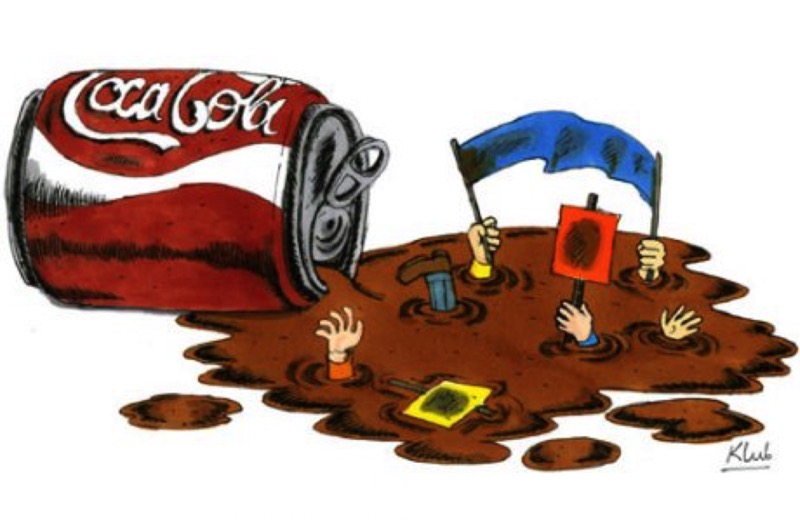
VEE2.net, "Coke Hit with New Charges of Murder, Rape, Torture at their processing and bottling plants in Guatemala," By Maryanne Euthalia, March 4, 2010
Read article
"A lawsuit (Case No. 10102514; Palacios et al. v. The Coca-Cola Co. and Does 1 through 10 inclusive) was filed on behalf of eight plaintiffs in the Supreme Court of the State of New York against The Coca-Cola Co. and Coke processing and bottling plants in Guatemala. This case involves charges of murder, rape and torture. The plaintiffs include union leaders and family members. This case has been brought in New York State because plaintiffs and other victims of human rights abuses lack access to an independent and functioning legal system within Guatemala, a country with a corrupt judiciary which has been undermined by the intimidation and murder of witnesses, prosecutors, lawyers and judges...'This case also presents evidence of Coca-Cola's direct involvement in trying to suppress the facts. Coca-Cola used the leverage of security for the family of Plaintiff Jose Palacios to try to get him to waive his employment rights and resign from his union. With this case, we finally have the evidence to get to a jury and let them decide if Coca-Cola is produced with the blood of union leaders and their family members. This case will expose the fraud of Coca-Cola's public relations campaign once and for all.' "
Metro Montreal, "L'affaire Coca-Cola: La boisson ensanglantée," By Matin Gignac, February 26, 2010
Read Article
"Quand c'est OK, c'est Coke? Pas pour les cinéastes Germán Gutiérrez et Carmen Garcia. Aprés avoir appris que des centaines de dirigeants syndicaux avaient été assassinés ces derniéres années, le duo a décidé d'enquêter, se déplaçant jusqu'en Colom?bie et notant l'implication de plusieurs compagnies internationales qui ferment les yeux sur ces crimes."
Le Devoir, "Syndicalisme en Colombie - Au-delà de L'Affaire Coca-Cola," By Isabelle Beaudry, February 24, 2010
Read Article
"L'Affaire Coca-Cola, ce documentaire portant sur l'entreprise Coca-Cola, n'a pas fini de créer des remous. La campagne Killer Coke, au cœur du film qui sera en salle le 26 février, appelle au boycottage tout en pointant un doigt accusateur contre le géant soup0231onné d'être impliqué dans l'enlévement, la torture et l'assassinat de chefs syndicaux, notamment en Colombie. Le film ne résume malheureusement pas entiérement la situation de la répression syndicale dans ce pays."
Voir, "Coke avale de travers," By Aurore Lehmann, February 18, 2010
Read Article Read Article
Windsor Star, "Killer Coke? Film courts controversy: NFB plugging slaying movie," By Jay Stone, Canwest News Service, February 9, 2010
Read Article
" 'We don't think the guys in Atlanta called Colombia and ordered the killing of these guys because they are troublemakers,' Gutierrez said in an interview from Montreal. However, he said, Coke headquarters in Atlanta did not step in to stop them. 'One simple phone call from Atlanta to these Colombia guys would stop these killings,' Gutierrez said. He pointed out that, in 1981, Coke refused to renew the contract with a franchise bottling plant in Guatemala after the murders of union leaders there, and those killings stopped. "
In the article, [Coke spokeswoman Kerry] "Kerr pointed out that, while only four per cent of workers in Colombia as a whole are unionized, 31 per cent of Coke workers belong to unions." This constant claim by Coke is a misuse of statistics: The July 2008 International Labour Organization (ILO) mission reported labor relations and working conditions at several Coca-Cola bottling plants found a clear difference between the employers' relationship and treatment of directly employed workers as compared to outsourced workers. In one Bogota plant, 70% of the operating staff, and 85% of the distribution staff is now outsourced, contracted through associated work cooperatives or employment agencies. A large number of these workers were formerly direct employees but the company forced them to change their status. (For more on this misuse of stats, read point 6, 'Solid Relationships with Organized Labor:' A Big Lie).
GreenMuze, "The Coca-Cola Case Review," By Greenmuze Staff, February 7, 2010
Read Article
"The Coca-Cola Case is an in-depth look at the secret world of a powerful multi-national corporation and a harsh reminder of the importance of knowing more about the products you consume or support. You will never look at Coca-Cola the same after you see just what lengths the world's most popular beverage company will go to in avoiding to take any responsibility for worker's rights in their factories and bottling plants."
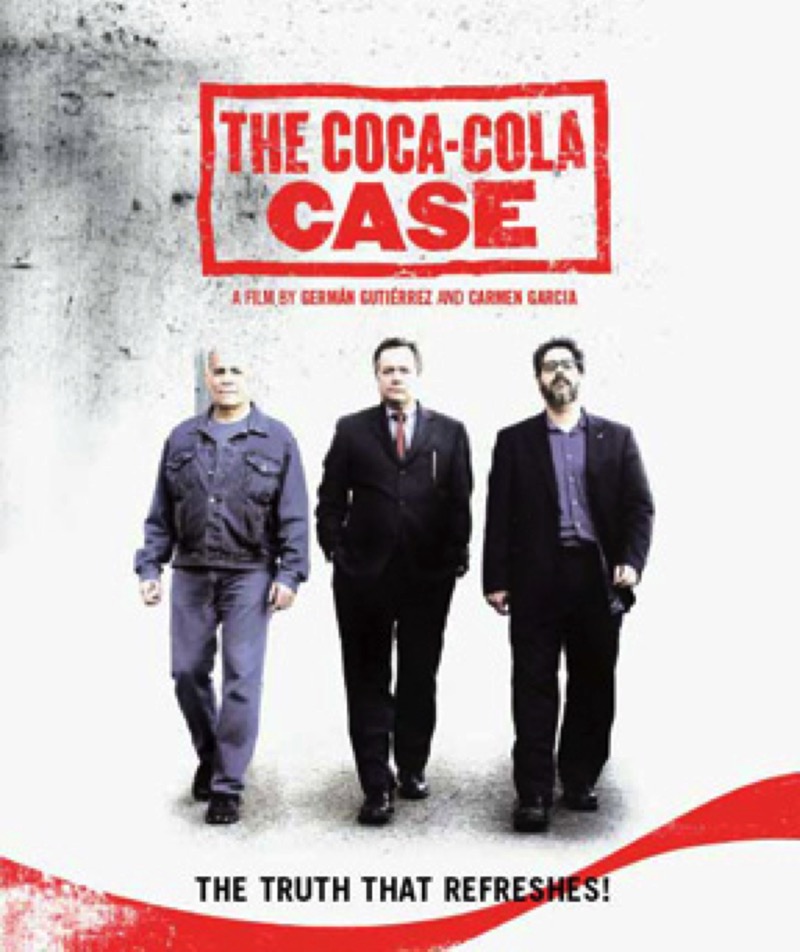
3. Lawsuit Hits Coke with New Charges of Murder, Rape, Torture in Guatemala
Bob Perillo Exposes IUF General Secretary Ron Oswald and Other in an Attmept to Suppress the Lawsuit against Coca-Cola and Its Bottlers in Guatemala
In his letter, Mr. Perillo highlights the involvement of USLEAP, Ron Oswald, General Secretary of the IUF and Stan Gacek, presently with the AFL-CIO International Affairs Department, among others, in running interference for Coca-Cola in efforts to suppress this lawsuit.
Read Letter in English
Press Release of March 1, 2010 regarding the lawsuit against Coca-Cola for human rights abuses in Guatemala.
"On Thursday, February 25, 2010, International Rights Advocates, a non-profit human rights organization, and the Conrad and Scherer law firm filed a new civil lawsuit against The Coca-Cola Company. The case involves a campaign of violence against two Guatemalan trade unionists and their families — including rape, murder, and attempted murder —at the behest of the management of INCASA, the owner of two Coca-Cola bottling plants and an instant-coffee plant (which also produces Coca-Cola syrup for fast-food restaurants) in Guatemala. The complaint against Coca-Cola can be viewed here. The two trade unionists are José Armando Palacios, who was forced to flee to the U.S. in early 2006, and José Alberto Vicente Chavez, whose son and nephew were murdered and whose daughter was gang raped on March 1, 2008."
En Español
"El viernes 25 de febrero de 2010, International Rights Advocates (Abogados de Derechos Internacionales), una organización de derechos humanos sin fines de lucro, asÍ como la firma jurÍdica Conrad and Scherer, entablaron otra demanda civil contra Coca Cola S.A. por un caso que implica una campaña de violencia —que incluye estupro, asesinato e intento de homicidio— contra dos sindicalistas guatemaltecos y sus familias. Dichos crÍmenes se cometieron a instancias de la administración de INCASA, propietaria de dos embotelladoras de Coca Cola y de una planta de café instantáneo (que también produce jarabe de Coca Cola para restaurantes de comida rápida) en Guatemala. Véase el texto de la demanda contra la Coca Cola (en inglés). Los dos sindicalistas en cuestión son José Armando Palacios, quién fue obligado a huir a los EEUU a principios de 2006, y José Alberto Vicente Chávez, cuyos hijo y sobrino fueron asesinados y cuya hija fue violada en grupo el 1 de marzo de 2008."
Bob Perillo responds to USLEAP's rebuttal to the letter below:
Read the Perillo response
Czech Free Press, "Žaloba na Coca-Colu za podÍl na porušovánÍ lidských práv v Guatemale," By Tereza Spencerova, March 4, 2010
Read Article
"Guatemal?tÍ odborovÍ predáci a jejich rodiny podali u Nejvy??Ího soudu státu New York ?alobu proti firme Coca-Cola Co., za to, ?e se podÍlela na násilÍ proti odborárum. HlavnÍ ?alobce José Armando Palacios tvrdÍ, ?e byl opakovane tercem ?toku poté, co se v roce 2004 stal clenem odboru v továrne Industria de Cafe, která v Guatemala City patrÍ práve Coca-Cole. Chuligáni najatÍ firmou Coke meli proniknout do jeho domu a s nabit?mi zbranemi vyhro?ovat jeho rodine smrtÍ."
Google translation from Czech to English:
Guatemalan union leaders and their families filed an action at the Supreme Court of New York against Coca-Cola Co.., That participated in violence against trade unionists.
Chief Prosecutor Armando José Palacios argues that he was repeatedly assaulted after in 2004 he joined the union in the factory Industria de Cafe, which in Guatemala City are one of Coca-Cola. Hoodlums hired by Coke had to break into his house and charged weapons to threaten his family's death.
Action is taken in New York because that Guatemala "is not available an independent and functioning legal system, the applicants note that in a country ruled by" a corrupt judiciary, accompanied by murder and intimidation of witnesses, prosecutors, lawyers and judges. The action seeks punishment for unlawful homicide, assault, bodily harm, violation of laws, arrested on fabricated evidence, unjustified enrichment and other charges. Guatemalan American lawyer representing the plaintiff Terry Collingsworth, who Cases against Coca-Cola has been working for more than a decade, in collaboration with the Campaign Stop Killer Coke.
The Atlanta Journal-Constitution, "Coca-Cola faces new violence claims in Guatemala," By Jeremiah McWilliams, March 2, 2010
Read Article
"Guatemalan union leaders and their families are pursuing a lawsuit in a New York court against Coca-Cola Co., accusing the world's biggest beverage company of negligence and complicity in violence aimed at union activists, as well as deception. The case draws together a coalition of lawyers and activists who participated in previous legal battles against Coca-Cola centering on its labor practices in Colombia. The lead attorney is Terry Collingsworth, who has pushed lawsuits against Coca-Cola for a decade. The unofficial public relations wing is the Campaign to Stop Killer Coke, one of the company's most aggressive and vociferous foes."
Read Press Release on Organic Consumers Assn. website
2010 Complaint on behalf of Coca-Cola workers in Guatemala against The Coca-Cola Co.
Business Week (Bloomberg), "Coca-Cola Sued in U.S. by Guatemalans Over Anti-Union Violence," By Patricia Hurtado, February 27, 2010
Read Article
"Coca-Cola Co. was sued by Guatemalan workers who say they endured a 'campaign of violence' by people working on behalf of bottling and processing plants Coke owns or owned there after they engaged in union activities. Jose Armando Palacios of Guatemala and eight other plaintiffs filed the complaint Feb. 25 in New York State Supreme Court in Manhattan, alleging negligence, deceptive practices and other claims against Coca-Cola, the world's biggest soda maker."
Read article in Gulf News, Malasia
Free Speech Radio News, "Labor unions in Guatemala charge Coca-Cola with murder, torture," By Ari Paul, February 26, 2010
Listen to Segment
A lawsuit that involves labor unions, a multinational corporation and murder is spanning borders. Today, lawyers for labor activists subjected to torture and killings at Coca-Cola bottling plants in Guatemala filed a lawsuit against the company in a New York City court. The attorneys are highlighting a spike in violence against trade unionists in the Central American country. FSRN's Ari Paul reports. Campaign to Stop Killer Coke Director Ray Rogers is interviewed.
4. Recent College Activities in Canada, Sweden & the U.S.
Carleton University, Ottawa, Ontario, Canada
The Charlatan (Carleton University), "Killing Coke on Campus," By Arik Ligeti, February 12, 2010
Read Article
"Since the documentary's [The Coca-Cola Case] screening, approximately 600 people had expressed interest in the campaign, Lloyd said. 'We haven't formally put out the petition again, but assuming we do, it seems that there's greater support from the student body,' Lloyd said."
DePauw University, Greencastle Indiana
The DePauw, "Killer Coke: My soft-drink journey," By Sam Holley-Kline, March 5, 2010
Read Article
"I love Coca-Cola. As far as soft drinks go, it's certainly my favorite. Pepsi aficionados say it's too sweet, or too syrupy for their tastes. Nonsense, I say...It's a shame. I still like Coke's taste. I really do. But I know that if I continue to drink it, I'll be complicit in all sorts of things in which I'd really rather not be complicit. Because of the environmental abuses, Pepsi's not much of an alternative."
McMaster University, Hamilton, Ontario, Canada
McMaster University Referendum Defeats an Exclusive Contract for Coca-Cola We just received news from McMaster Campus Choice that the referendum for an exclusive Coke contract was defeated:
The vote:
No: 1966
Yes: 1584
Abstain: 711
Spoiled: 19
Total Valid Ballots: 3550
Total Ballots Cast: 4280
Congratulations to McMaster Campus Choice
and the students of McMaster for a great job!
Mt. Allison University, Sackville, New Brunswick, Canada
The Argosy, "The Coca-Cola Case," By Marlee Leslie on behalf of Coke-Free Mt. A, February 11, 2010
Read Article
"Increased awareness of the realities of Coke's international practices has prompted many universities to impose an outright ban on the selling of Coke products on campus, and many others are currently in the process of doing so. Coke-Free Mt. A is a group at Mount Allison University seeking alternatives to the Coca-Cola products being sold across campus. The group was formed following the Cinema Politica screening of The Coca-Cola Case and subsequent discussion, where students were given the option of signing up to begin an activist group. The purpose of Cinema Politica is not only to increase awareness but also to foster activism. Following the film, some of the close to 150 people who came to Cinema Politica that evening remained to discuss how the problems of Coke might be addressed here at Mount Allison."
New York University, New York, NY
Over the past couple of weeks, a team working with the Campaign to Stop Killer Coke distributed more than 10,000 copies of the following flyer to the NYU community. Distribution of the flyers will continue. The flyer focuses on Coke's human rights and environmental abuses and on NYU Trustee Barry Diller. Diller is also one of 14 members of the Board of Directors that sets policy for The Coca-Cola Company.
The flyer points out:
"In 2005, New York University made headlines when the University Senate pledged its commitment to human rights by kicking Coca-Cola off campus. Four years later, the Senate turned its back on these principles, failed to live up to its own resolution and invited Killer Coke back to NYU, leaving many students angry. As Jeff Olshansky, the co-chair of NYU Law Students for Economic Justice said, "NYU made a promise to these Colombian workers and they broke that promise. NYU decided to put their financial relationship with Coke above human rights."
"Coincidentally," Diller purchased $20 million of The Coca-COla Company stock in March 2009, only weeks after NYU reversed their ban on Killer Coke.
Students are calling on NYU to dump Coke, dump Diller and reaffirm its commitment to Human Rights and Social Justice.
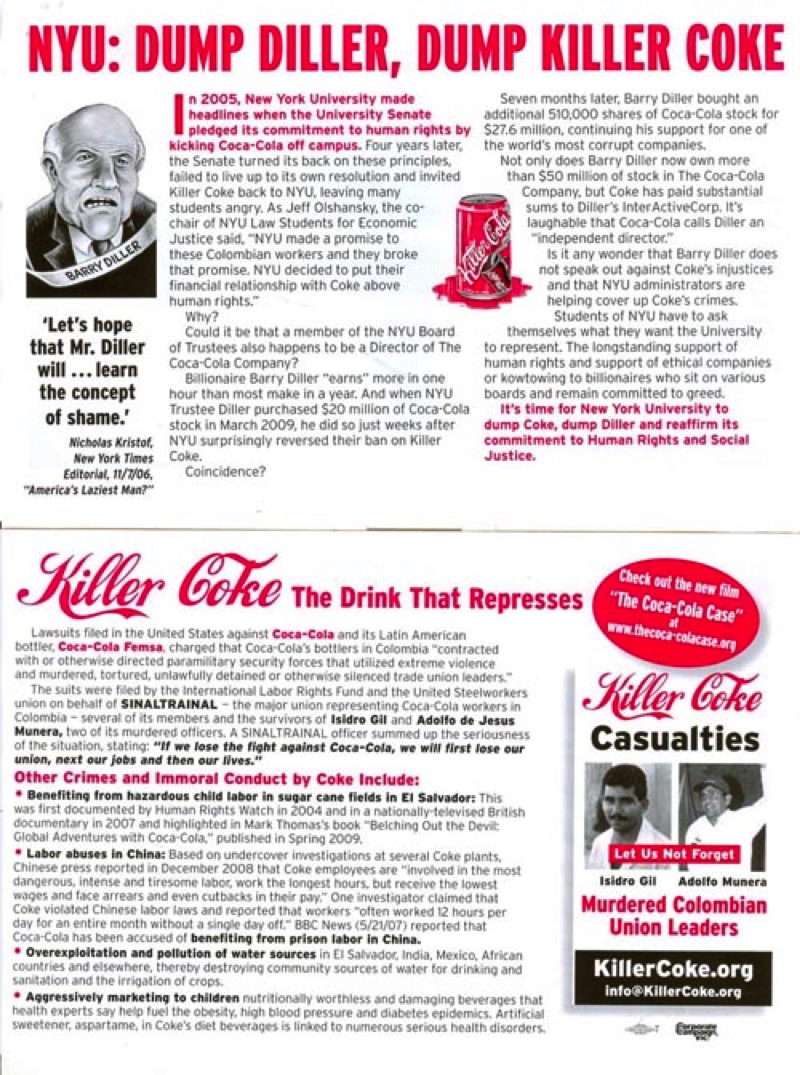
Plans are in process for a premier showing of The Coca-Cola Case in a major auditorium at NYU in April.
St. Olaf College, Northfield, Minnesota
We received a message from St. Olaf on March 22:
"St. Olaf currently has a group of students working on the Killer Coke Campaign. We have published information in the campus newspaper, spoken with administrators, and generated literature for distribution. We are also preparing to make a sculpture out of Coke cans.
A week of awareness to include a screening of the Coca Cola Case, a skyped Q&A session with Campaign to Stop Killer Coke Director Ray Rogers, a panel discussion, and a lecture are in the works. Our goal is to generate enough student support to convince the administration at St. Olaf that Coca-Cola is not in line with our wishes or the goals of our college.
Stockholm University, Stockholm, Sweden
On February 8, Students packed an auditorium at Stockholm University with more than 150 people to watch "The Coca-Cola Case." Students set up a Skype hookup with Campaign Director Ray Rogers. Ray answered numerous questions after its showing. This has led to students mobilizing a campaign to kick Coke off the University campus. A Coke representative was scheduled to be present at the screening as part of a panel, but as usual, pulled out at the last minute.
As a followup to "The Coca-Cola Case", the students are planning to show the 2007 Channel 4 (UK) film "Mark Thomas on Coca-Cola", another well-researched film that Coca-COla doesn't want seen.
University of California-Long Beach
Email from University of California-Long Beach:
As some of you might know, we screened the film "The Cost of a Coke" (a film by University of Montana grad, Matt Beard) on November 10, 2009. We assumed that 50-75 students would attend our event and only reserved 100 chairs. But, on the day of the event we had close to 150 students, some of which had to sit on the floor. We had a DJ (Eddie "DJ Kaboom" Iniestra) playing music as we welcomed our attendees, along with some refreshments. On the chairs we had placed a flyer ("Stand Up for Labor and Human Rights") and a petition ("Dear Coca-Cola Board Members"), of which many signed and returned. We received very positive feedback and many asked to start a coalition on campus.
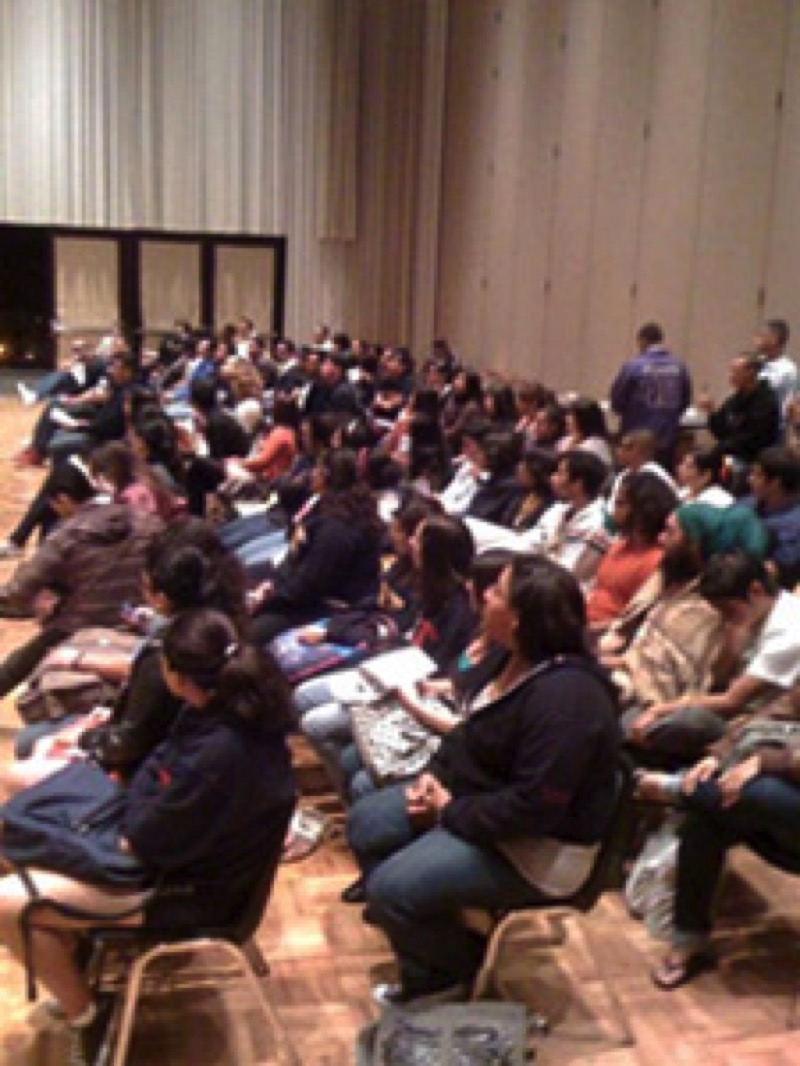
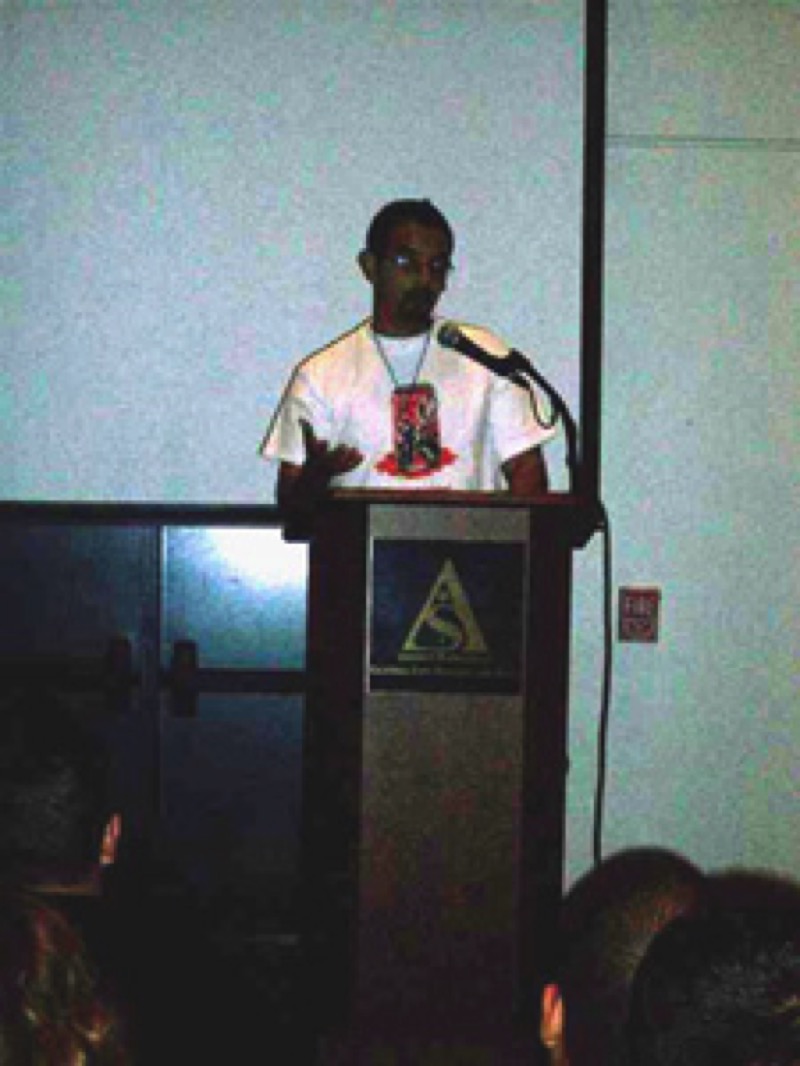
Since the event we have begun to gather different campus organizations to be part of this coalition. And it has begun to form some structure in recent weeks.

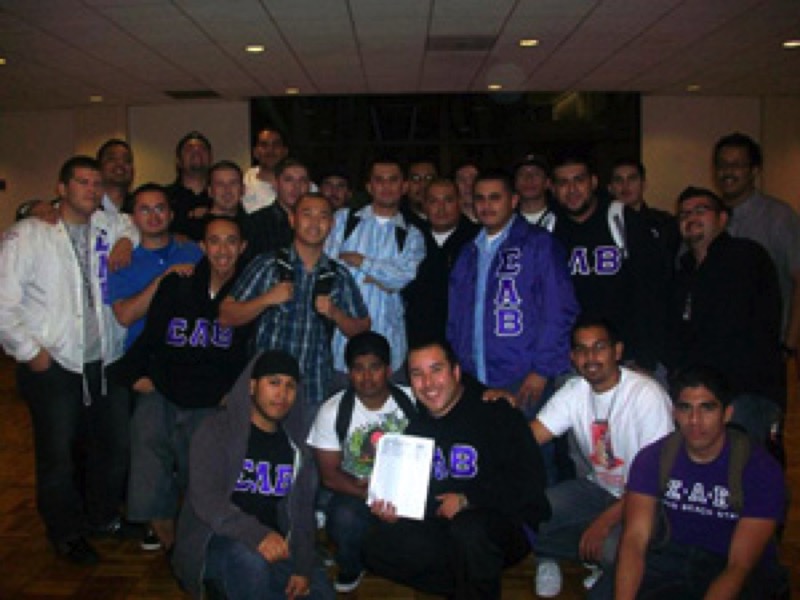
So building coalitions with various organizations will take a while. Things look very bright though, and we hope that sometime soon we can host the new documentary, "The Coca Cola Case," on our campus.
University of Saskatchewan, Saskatoon, Saskatchewan, Canada
TheSheaf.com, (University of Saskatchewan) "Killer Coke is no joke: Deadly trouble in the Coke bottling plants of Colombia, By Greg Reese, February 9, 2010
Read Article
"I like Coke. It tastes good and it wakes me up when I'm tired. So, I would like to think that the accusations leveled against the soft drink company in The Coca-Cola Case, a documentary funded in part by the National Film Board of Canada, are not true — but I have a bad feeling..."
"Even before the first screening at Concordia University in Montreal, Cinema Politica was threatened with legal action from lawyers representing the soda-pop giant. So what exactly is Coca-Cola trying to stop people from viewing?"
Washington State University, Pullman, Washington
For months, many students on the Pullman campus of Washington State University have been demanding that the university not renew its exclusive contract with The Coca-COla Company. Michael Schwartz, a member of the Progressive Student Union (PSU) and a grad student in history, was quoted in The Daily Evergreen: "A world-class university like WSU should not endorse companies like Coke."
Chelsea Tremblay, a PSU member and a senior political science and women's studies major, said: "We don't think all Coke employees or people who drink Coke are bad, but someone else deserves the contract at WSU."
Students have promoted alternative products, giving out free Jones Soda, Pepsi and other beverages and have mobilized students to sign petitions against allowing Coke to renew its contract.
Students have vowed to continue their fight in light of a recent decision by WSU administrators to exclude all students from any decisions regarding the new beverage contract. According to a recent article, the administration is not taking into consideration any of the serious ethical issues regarding well-documented worldwide labor, human rights and environmental abuses and Coke's efforts to cover up these issues.
Administrators, concerned with students' plans for future protests and other actions to undo any decision prolonging Coke's presence on campus, are bringing students into the process in a condescending manner. They are setting up a meeting requested by Coke at this late date to respond to students' concerns.
5. Health Issues Coke Wants to Hide
Crain's New York Business, "A beverage tax would cut the fat," By Richard F. Daines, M.D., March 14, 2010
Read Article(A subscription is needed to read this article.}
"Why a tax on nondiet soda and other sugar-sweetened beverages? Research directly links soda and other sugary drinks to increased rates of obesity and diabetes. Experts, including Centers for Disease Control and Prevention Director Thomas Frieden, say taxing sugary beverages is the single most effective way to reduce obesity.
"While obesity rates have tripled over the past 30 years, prices for sugary beverages have fallen relative to inflation, partly due to subsidies for corn producers, while advertising has promoted increased consumption and portion sizes. The beverage industry's price-elasticity models indicate the tax will reduce consumption of sugary beverages by about 15% as consumers shift toward lower-cost, lower-calorie beverages. The $1 billion a year raised by the tax will support critical health care services, preventing deeper cuts at a time when the state must close a $9 billion deficit. As obesity decreases over time, so will spending on related conditions like kidney dialysis and amputations. Worker productivity will rise."

The Reporter, "New kind of war on sodas," By Jose de la Isla, February 23, 2010
Read Article
"Sugary drinks were the target because they contribute to more pounds gained because of their calorie content, according to the U.S. Centers for Disease Control and Prevention...
"Behind the beverage is a scientific controversy concerning high fructose corn syrup (HFCS), as found in soda, which is more 'unstable' (can cause tissue damage) than table sugar, according to the science Maldonado-Schullo reported."
Basil and Spice, "Coca-Cola Under Fire: Government Health Agency Urged to Drop Coca-Cola as Heart-Health Partner," The Center for Science in the Public Interest, February 16, 2010
Read Article
"The National Heart, Lung, and Blood Institute should not partner with Coca-Cola to raise awareness of heart disease among women, according to the Center for Science in the Public Interest. In a letter to the NHLBI, the nonprofit Center for Science in the Public Interest says overweight and obesity are prime risk factors for heart disease, and the agency shouldn't be bolstering the dismal reputation of the Coca-Cola Company, the world's biggest manufacturer of obesigenic soft drinks."
Daily Mail, "Child 'mini-marketeers' paid by junk food firms to secretly push products among their friends," By Sean Poulter, February 14, 2010
Read Article
"Youngsters are being paid up to £25 a week to promote sugary soft drinks and other products via social networking sites and playground chat. Products like Fanta and Cheesestrings are at the centre of big business stealth marketing campaigns...This involves performing a range of tasks including, putting up flyers, posting on message boards and social networks such as Facebook and Bebo, and hosting parties for friends."
Response: If we don't stop our children being exploited, no one else will," By Richard O'Hagan
The New York Times, "Soda: A Sin We Sip Instead of Smoke?" By Mark Bittman, February 14, 2010
Read Article
"The problem is that at roughly 50 gallons per person per year, our consumption of soda, not to mention other sugar-sweetened beverages, is far from moderate, and appears to be an important factor in the rise in childhood obesity. This increase is at least partly responsible for a rise in what can no longer be called 'adult onset' diabetes — because more and more children are now developing it."
See chart "Drinking Sugar"
The Boston Globe, "Falsely sweet pledges from trash food companies," By Derrick Z. Jackson, February 13, 2010
Read Article
"A key source of the obesity problem now claims to be part of the solution, in the spirit of beer companies and cigarette companies claiming marquee roles in solving underage drinking and smoking...The American Beverage Association and Coke entities spent $31 million in lobbying last year, much of it to shoot down taxes on sugary beverages at federal and state levels. The association had a $2 million ad campaign against taxes, which public health experts calculate would cut consumption and contribute revenues to public health programs to repair the damage done to the nation's health by soda."
MinnPost.com, "How Coca-Cola fought for our right to be obese," By Eric Black, February 9, 2010
Read Analysis of Article Above
"The short version of the tale is that Coca-Cola and others who make a lot of money selling soft drinks (this includes big fast-food chains — McDonald's and Domino's were named in the piece) were able to recruit a lot of organizations that represent poor people to join them in opposing the idea of putting a tax on sugared beverages. The idea behind the tax is it would discourage consumption of sugared beverages, which contributes to the American plague of obesity, which is a major source of our unhealthiness."
Pancreatic Cancer Risk; Beverage Industry Says Study Is Flawed," By Kathleen Doheny, February 8, 2010
Read Article
" 'People who drank two or more soft drinks a week had an 87% increased risk — or nearly twice the risk — of pancreatic cancer compared to individuals consuming no soft drinks,' says study lead author Noel T. Mueller, MPH, a research associate at the Cancer Control Program at Georgetown University Medical Center, Washington, D.C. The study is published in Cancer Epidemiology, Biomarkers& Prevention, a journal of the American Association for Cancer Research."
Los Angeles Times, "Beverage industry douses tax on soft drinks," By Tom Hamburger and Kim Geiger, February 7, 2010
Read Article
"Employing a broad-based lobbying effort, the soft drink industry has smothered a plan to tax sugared beverages — a plan advocates said would have reduced obesity and helped finance healthcare reform...
"Analysts at Yale University have calculated that a penny-an-ounce tax would induce a 23% drop in consumption, and the Congressional Budget Office has estimated that a smaller tax could raise $50 billion over 10 years. Although the extent to which such a tax might drive down obesity rates is scientifically unclear, nutrition experts argue that it would, at the least, improve health by discouraging consumption of sodas, which have no nutritional value but are packed with calories."
6. India's Kerala State Gov't Seeks $48 Million Fine from Coke, etc.
Press Release, "Coca-Cola Liable for US$ 48 Million for Damages — Government Committee," March 22, 2010
Read Release
"In a major development, a High Power Committee established by the state government of Kerala in India has recommended today that Coca-Cola be held liable for Indian Rupees 216 crore (US$ 48 million) for damages caused as a result of the company's bottling operations in Plachimada. The Coca-Cola bottling plant in Plachimada has remained shut down since March 2004 as a result of the community-led campaign in Plachimada challenging Coca-Cola's abuse of water resources."
Press Release, "Groundwater Levels Continue Downward Spiral Around Coca-Cola Plant: Continues Bottling in Drought Area, Farmers and Villagers Left Without Water," India Resource Center, March 11, 2010
Read Release
"The Coca-Cola company has continued to operate its bottling plant in Kala Dera in Jaipur, India even as the area has been declared a drought area last summer and the groundwater levels are falling sharply — leaving the largely agrarian community with severely restricted access to water. Data obtained this week by the India Resource Center from the Central Groundwater Board, a government agency, confirm that groundwater levels in Kala Dera fell precipitously again — a drop of 4.29 meters (14 feet) in just one year between August 2008 and August 2009, from 30.83 meters below ground level to 35.12 meters respectively."
Groundwater Levels in Kala Dera — Before and After Coca-Cola Started
Operations in 2000
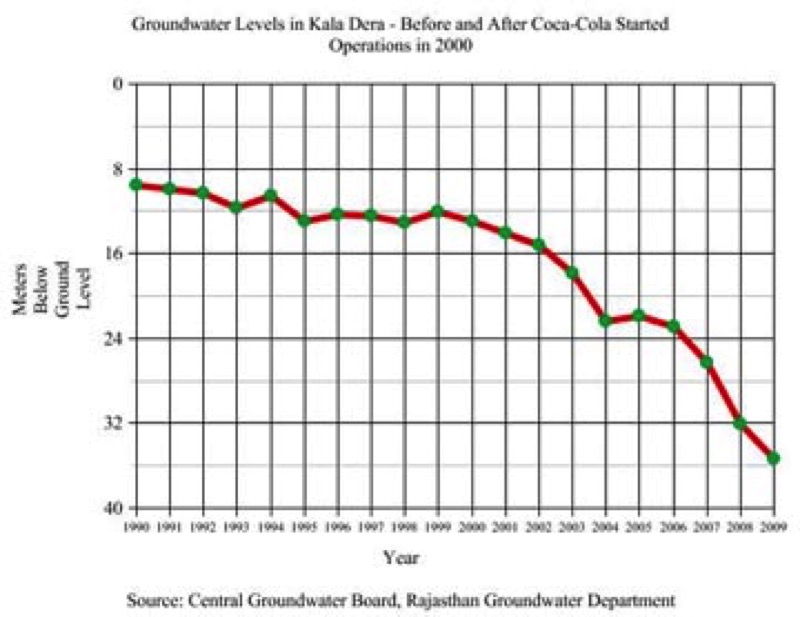
Source: Central Groundwater Board, Rajasthan Groundwater Department
The Huffington Post, "Eco Etiquette: How Bad For The Environment Is Diet Coke?," By Jennifer Grayson, M arch 10, 2010
Read Article
"...if you're drinking at least one a day, you might be surprised to know that there are some interesting environmental ramifications for your beloved beverage — aside from the already well-publicized negative ones regarding your health, like increased risk of weight gain and a decline in kidney function."
7. Coke Campaign in Chiapas, Mexico
CIEPAC (Chiapas, Mexico), "Stop Killer Coke: The Boycott Coca-Cola Campaign," 2006
Read CIEPAC's Pamphlet
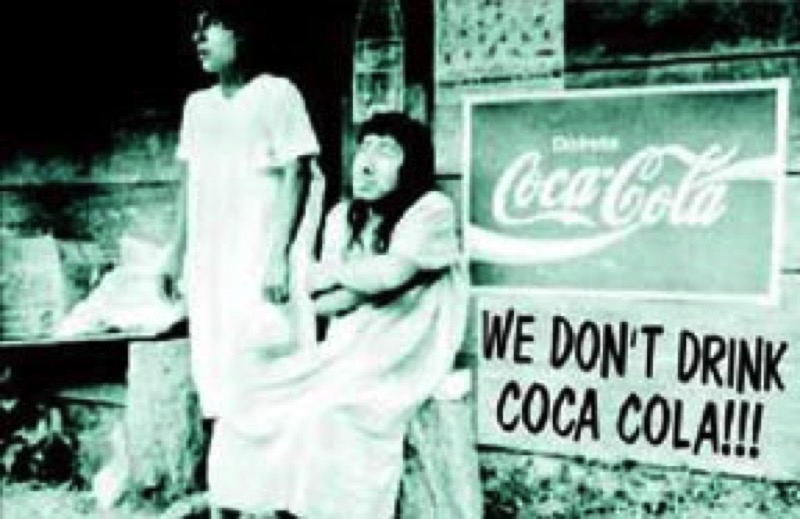
Campaign Director Ray Rogers recently spent four days in Mexico City this month where he addressed the first National Consumer Convention (Convención Nacional de Consumidores). Rogers did a series of interviews with the media on the Campaign to Stop Killer Coke and met with many organizational leaders who want to spread the Campaign throughout Mexico. More on this subject in our next newsletter.
8. New Alternative to Coke in France
Cyber Bougnat, "Auvergnat Cola, le Coca made in Auvergne: L'entreprise cantalienne Juhles va commercialiser dans les prochains jours une copie locale du fameux Coca-Cola," Par Bertrand, jeudi 22 janvier 2009
Read Article
From Solange: "News: In Auvergne, they have created a drink called "Cola Auvergnat" made with a regional yellow plant, well known for its roots, called gentiane! Here is the link; Here is another link.
"It's a good thing to bring competition with the Coca-COla giant of Atlanta."
The site of Auvergnat Cola
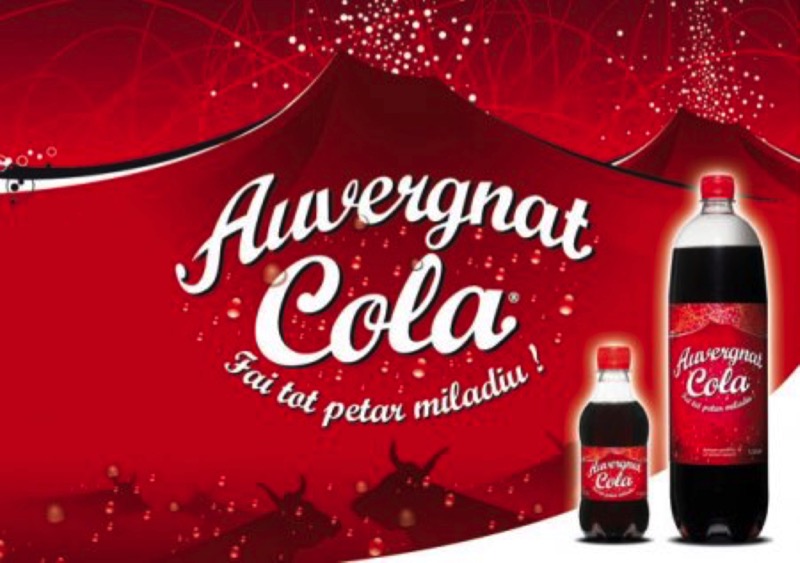
9. An Olympian Chorus in Canada: [Coke is the] "Drink of the Death Squads"
Solidarity Notes Choir, "The Drink of the Death Squads," February 7, 2010
Watch Video
Solidarity Notes Choir performance at a Vancouver SkyTrain station in Vancouver of a song by David Rovics, in front of Coke advertising, just before transit police arrive.
An email from Vancouver: "In Vancouver, ads by Olympic sponsor Coca-Cola are absolutely ubiquitous. They've bought every single billboard location in many Skytrain stations. In response, the Solidarity Notes Choir took some encouraging musical action at a Skytrain station. For your musical enjoyment, here's the YouTube video:"











